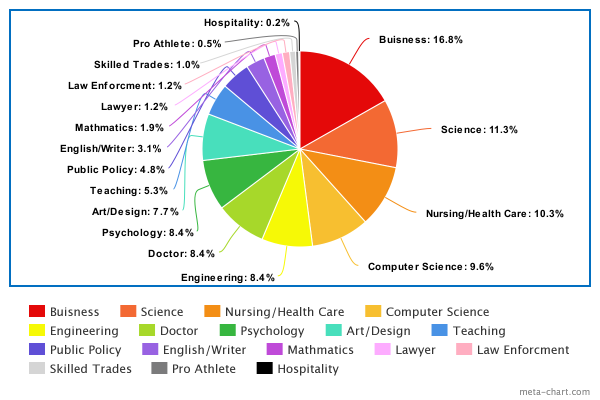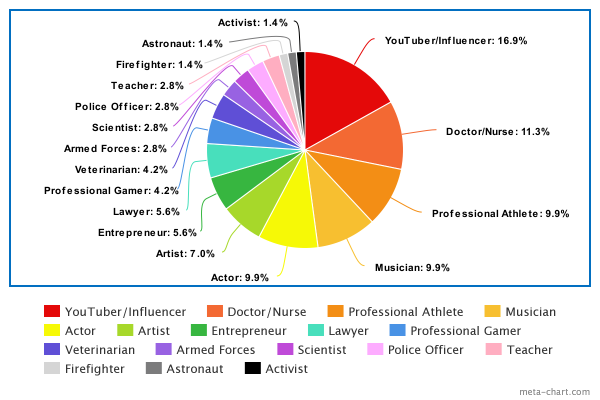There is a culture within Troy High School where certain careers are seen as the “norm” or the best path. For instance, the top career category chosen by Troy High School students is “Business,” which is in complete contrast to the category of “Youtuber/Influencer” chosen by students on a national survey conducted by YouGov.
At a national level, the top five careers chosen by high schoolers are predominantly careers that do not have a stable demand for work. At Troy High School, the top five careers chosen by students could all be considered stable in nature.
When asked what is influencing students to choose careers considered traditionally stable, Thomas Keegan, Troy High School counselor, stated, ”Troy promotes students’ ideas of ‘great’ life outcomes, and we try to encourage kids to seek out high academic pursuits. We encourage kids to take at least one AP class to have that [high academic] exposure.”
Keegan then shared that, in contrast to Troy High School’s culture of “high academic pursuits,” other places around the United States may lack an academic “pushing.”
If schools do not heavily promote academics, it is logical that students would find interest in a variety of careers that may land in a less academic category. Troy High School directly promotes students taking higher-level classes, so students can explore their different academic interests and come to an educated conclusion on what they may want to pursue as a career. If students are not given a slight push into more academic-based classes, they are more likely to come to a conclusion about what they want to do in the future based on their non-academic activities and interests.
Athletics, music, acting and art are all typically things people choose to pursue in their free time. So, without an academic push, many high schoolers will gravitate to these same passions as future careers, as they don’t have a full perspective on academic and non-academic careers.

This same idea can simultaneously be applied to Troy High School, but in the opposite sense. Troy High School promotes academic pursuits as it allows students to experiment with a variety of academic areas. However, if an individual is experiencing a continuous amount of external pressure, which could come from friends, family or a financial situation, to pursue strictly academics, they may lose sight of other possibilities. This, hypocritically, does not offer students a full academic and non-academic perspective of possible careers.
There are some careers that do appear on both charts, but their positions tend to be rather different. Pro Athlete, which is the third most chosen career by high schoolers at a national level, is at the bottom of the list of careers chosen by Troy High School students. This could be due to the fact that Troy High School’s environment promotes academics as opposed to athletics.
When asked why she wanted to pursue a career in athletics rather than a more traditional career, senior Erica Didocha, who is interested in being a professional hockey player, said she wants to be able to compete in hockey, but if something happens, she will still have opportunities to “be a coach, physical therapist or manage [a sports team].”
Didocha continues, “I think I would still really like to do that, because I’m still able to be there and be a part of the community.”

Didocha is interested in pursuing athletics because of her individual passions as well as the community. In a career that is typically considered to lack stability, Didocha has found solutions to give her future a sense of security.
In contrast, senior Rebecca Austin, who wants to be a sports medicine physician, is interested in a more traditional career. When asked why she wants to pursue this career, she responded, “I want to be able to help athletes prevent and recover from injuries, because that’s something I have struggled with. I want to be better than the doctors I’ve had.”
Also, when asked if she had ever or would ever consider a non-traditional career, Austin said, “Yes. Last year I wanted to be a pilot, and when I was younger, I wanted to be a singer.”
Austin stated she decided against these careers because “I wanted to be a doctor for a long time, so I decided against aviation because I didn’t have any experience in it beforehand, and it’s kind of a hard field to get into. Then singing, I just stopped singing.”
With that, there is a stark contrast in students pursuing careers in the arts, significantly less than they have in previous years. In the past two years, 30 students collectively planned to go into a career based in the arts, whereas this year only two students planned to pursue this type of job.
When asked what might be causing the shift away from more artistic careers, Keegan said, “All students now [those who were surveyed] were heavily affected by the COVID-19 pandemic during their formative years. Economically, that took a toll on people, so I think job security and safety, in a traditional role, may play a part in that.”
Many saw loved ones struggle during the pandemic to provide in the same way they were pre-pandemic. Many even lost their jobs because the demand for their career, at that time, was less than it would be traditionally. This may cause students to seek out stability in their future careers out of fear that they may not be able to provide for themselves or others in the future if they do not pick a safe and stable option.
With factors such as students searching for stability in their careers and Troy High School’s promotion of academic pursuits, many students are continuing to lean towards more academic or stable careers.

